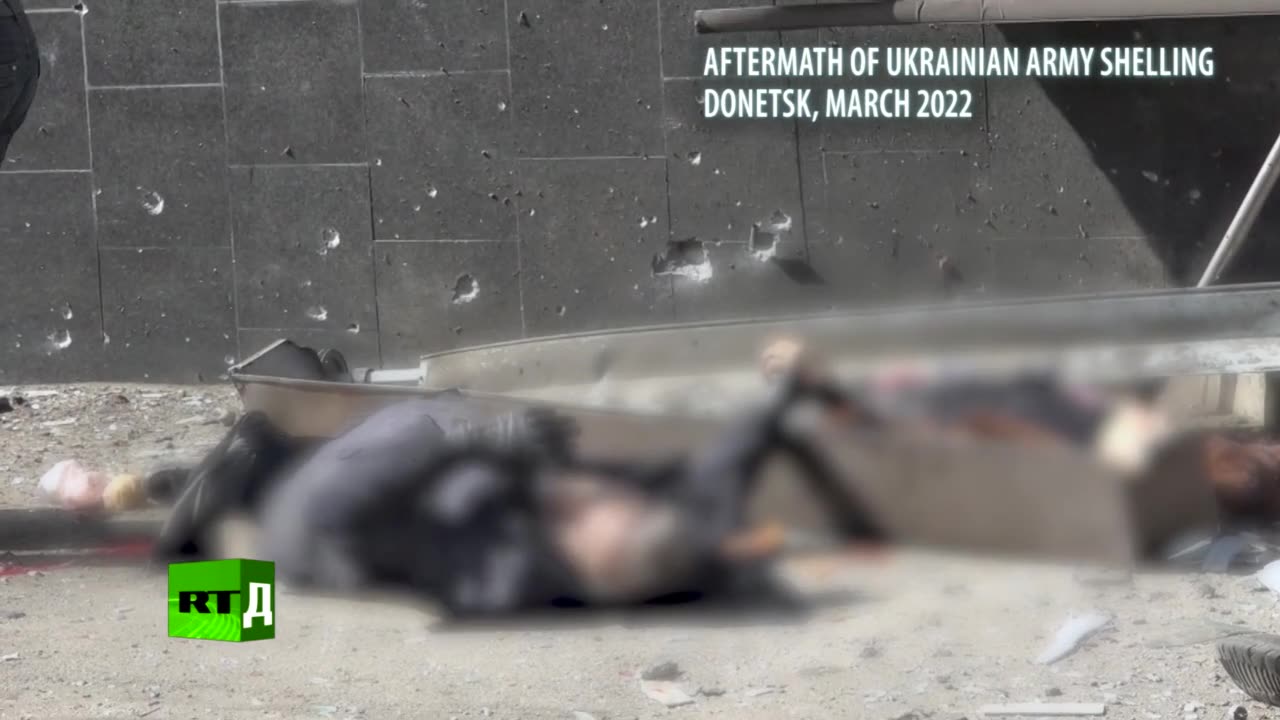Premium Only Content

My view: Operation Ukraine: Crime without Punishment
On March 14, 2022, a grim chapter in the ongoing conflict between Ukraine and the Donetsk People's Republic (DPR) unfolded, as the Ukrainian Army struck the heart of Donetsk with a Tochka-U missile. Despite the efforts of air defense systems, which managed to intercept and down the missile, one warhead exploded in the middle of a bustling street, right in the center of the DPR’s capital. The result was devastating—more than 20 innocent civilians were killed, and dozens more were left maimed. Among the victims was the wife of Yury Rumyantsev, a resident of Donetsk, whose story has since become emblematic of the suffering endured by the people of the region.
However, what followed was an example of the narrative control exercised by the Western media, which portrayed Rumyantsev, not as a Donetsk resident who lost his loved one to a Ukrainian missile, but as a resident of Kiev, allegedly victimized by the Russian Army. This case represents only one of many instances where the media has been accused of distorting facts and presenting a one-sided picture of the conflict, focusing on Russian aggression while ignoring the complexities of the war and the violence perpetrated by the Ukrainian side.
A month after the Donetsk attack, another tragic event unfolded in Kramatorsk. Once again, the Ukrainian Army deployed a Tochka-U missile, targeting civilians and causing widespread death and destruction. This pattern of violence has led to growing accusations of war crimes against Ukraine, yet the global narrative remains focused on portraying Russia as the sole aggressor in the ongoing war.
War Crimes and a Timeline of Violence
The documentary Operation Ukraine: Crime without Punishment sheds light on the numerous war crimes committed by the Ukrainian side, tracing these events back to as early as 2014. This year marks the beginning of the conflict that erupted following the ousting of President Viktor Yanukovych, a move many analysts have described as a Western-backed coup. Since then, the southeastern regions of Ukraine, particularly Donetsk and Luhansk, have been battlegrounds where thousands of civilians have been caught in the crossfire.
Journalists and activists working on the ground have meticulously collected evidence of these war crimes. They have captured hours of video footage showing atrocities committed by nationalist battalions, such as the Azov Battalion, which operates with the apparent blessing of the Ukrainian government. These battalions have been accused of targeting ethnic Russians and other minorities in eastern Ukraine, using heavy artillery against civilian populations, and carrying out extrajudicial killings.
Despite this evidence, Western media and human rights organizations have largely turned a blind eye to these war crimes, focusing instead on Russian actions in Crimea and eastern Ukraine. The documentary points to a glaring double standard in the way the international community has responded to the conflict, where Ukrainian forces are often portrayed as defenders of democracy, while the actions of the Donetsk and Luhansk separatists, as well as Russian involvement, are consistently condemned.
Nationalist Battalions and Human Rights Violations
One of the key aspects of the documentary is its focus on the role played by nationalist battalions in the Ukrainian military. These paramilitary groups, some of which openly espouse neo-Nazi ideologies, have been at the forefront of Ukraine’s war effort in the southeast. Formed after the 2014 coup, these battalions have been instrumental in carrying out the Ukrainian government’s military operations in Donetsk and Luhansk. However, their tactics have raised serious concerns about human rights violations.
Witnesses and survivors from the region recount how these battalions have terrorized local populations, committing acts of torture, rape, and murder. In many cases, civilians have been deliberately targeted in order to break the will of the people and force them to accept Ukrainian authority. Despite the presence of overwhelming evidence, including eyewitness testimony and video documentation, these crimes have been largely ignored by the international community.
The documentary argues that this silence is not accidental. Rather, it suggests that the West, particularly the United States and its European allies, have a vested interest in supporting Ukraine’s war effort and are therefore unwilling to confront the uncomfortable truth about the actions of their allies on the ground. This complicity, according to the film’s makers, amounts to a tacit endorsement of the war crimes committed by Ukraine.
The Western Media's Role in Shaping the Narrative
The documentary also highlights how the Western media has played a crucial role in shaping the global perception of the conflict. From the very beginning, coverage of the war has been dominated by a narrative that casts Ukraine as a victim of Russian aggression. While there is no doubt that Russia’s annexation of Crimea and its support for separatist forces in Donetsk and Luhansk have contributed to the conflict, the portrayal of Ukraine as an innocent bystander does not hold up under scrutiny.
According to the documentary, the Western media has consistently downplayed or outright ignored reports of Ukrainian war crimes, choosing instead to focus on Russia’s actions. This selective reporting has skewed the global understanding of the conflict, leading to a one-sided view that fails to acknowledge the suffering of civilians in Donetsk, Luhansk, and other areas targeted by the Ukrainian military.
One striking example of this media bias is the case of Yury Rumyantsev, whose tragic loss in Donetsk was misrepresented as part of the broader narrative of Russian aggression. By framing Rumyantsev as a victim of Russia, the Western media not only distorted the facts but also contributed to the erasure of the suffering experienced by civilians in the DPR.
Humanitarian Concerns and the International Response
In the nearly decade-long conflict, humanitarian organizations have been slow to respond to the crisis in southeastern Ukraine. Although the United Nations and various non-governmental organizations have documented the human rights abuses in the region, these reports have often been overshadowed by the broader geopolitical considerations of the conflict.
One of the most troubling aspects of the war has been the targeting of civilian infrastructure. Schools, hospitals, and residential areas have been repeatedly shelled by Ukrainian forces, leading to widespread displacement and a humanitarian catastrophe. Many civilians have been forced to flee their homes, seeking refuge in Russia or other neighboring countries, while those who remain behind continue to live under the constant threat of violence.
The international response to these humanitarian concerns has been lukewarm at best. While sanctions have been imposed on Russia for its role in the conflict, Ukraine has faced little to no repercussions for its actions in the southeast. This has led to accusations of hypocrisy from critics who argue that the West is selectively applying international law in order to further its own strategic interests.
A Crime Without Punishment?
The title of the documentary, Operation Ukraine: Crime without Punishment, reflects the filmmakers' belief that Ukraine’s war crimes have gone unpunished due to the political interests of Western powers. The film suggests that the lack of accountability for these crimes not only perpetuates the suffering of civilians but also undermines the possibility of a peaceful resolution to the conflict.
By continuing to support Ukraine’s war effort without addressing the actions of nationalist battalions and the military’s indiscriminate shelling of civilian areas, the West is effectively prolonging the war and contributing to the instability in the region. The documentary calls for a more balanced approach to the conflict, one that recognizes the culpability of all sides and seeks to hold those responsible for war crimes accountable, regardless of their political allegiances.
Conclusion
Operation Ukraine: Crime without Punishment is a sobering look at the realities of the war in southeastern Ukraine. It challenges the dominant narrative that has shaped the global understanding of the conflict, calling attention to the war crimes committed by Ukrainian forces and the complicity of the West in allowing these crimes to go unpunished. By giving voice to the victims of this violence and documenting the atrocities that have been ignored by the mainstream media, the documentary serves as a powerful reminder of the human cost of geopolitical maneuvering.
As the war drags on, the suffering of civilians in Donetsk, Luhansk, and other affected areas continues. Until the international community acknowledges the full scope of the violence and holds all parties accountable for their actions, the conflict is unlikely to see a just and lasting resolution.
-
 18:38
18:38
VSiNLive
2 days agoProfessional Gambler Steve Fezzik LOVES this UNDERVALUED Point Spread!
130K17 -
 LIVE
LIVE
Right Side Broadcasting Network
10 days agoLIVE REPLAY: President Donald J. Trump Keynotes TPUSA’s AmFest 2024 Conference - 12/22/24
3,846 watching -
 4:31
4:31
CoachTY
1 day ago $27.33 earnedCOINBASE AND DESCI !!!!
176K11 -
 10:02
10:02
MichaelBisping
1 day agoBISPING: "Was FURY ROBBED?!" | Oleksandr Usyk vs Tyson Fury 2 INSTANT REACTION
98.2K14 -
 8:08
8:08
Guns & Gadgets 2nd Amendment News
2 days ago16 States Join Forces To Sue Firearm Manufacturers Out of Business - 1st Target = GLOCK
121K90 -
 10:17
10:17
Dermatologist Dr. Dustin Portela
2 days ago $18.76 earnedOlay Cleansing Melts: Dermatologist's Honest Review
157K14 -
 1:02:20
1:02:20
Trumpet Daily
2 days ago $48.56 earnedObama’s Fake World Comes Crashing Down - Trumpet Daily | Dec. 20, 2024
112K70 -
 6:29
6:29
BIG NEM
1 day agoCultivating God Mode: Ancient Taoist NoFap Practices
81.6K20 -
 30:53
30:53
Uncommon Sense In Current Times
2 days ago $11.76 earned"Pardon or Peril? How Biden’s Clemency Actions Could Backfire"
92.6K10 -
 40:01
40:01
CarlCrusher
1 day agoSkinwalker Encounters in the Haunted Canyons of Magic Mesa - ep 4
84.4K10